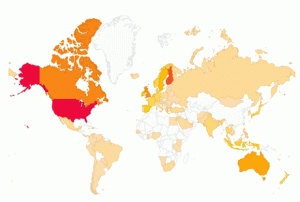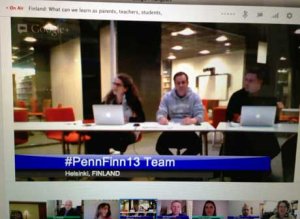Penn-Finn Learnings 2013: A Wealth of Resources for Connected Educators
Blogger Joe Mazza, on behalf of the US and Finnish educators participating in Penn-Finn Learnings 2013, shares the resources yielded by a global edchat live from the University of Helsinki.
Your content has been saved!
Go to My Saved Content.Last week, the annual Silfen Forum was held at the University of Pennsylvania. The theme, Open Learning and the Future of Higher Education, brought together educators from around the country, including the panelists Amy Gutmann, Martha Kanter, Thomas Friedman, Daphne Koller and William Kirwan. A common thread during the one-hour conversation was on how the world has gone from connected to hyper-connected over the last seven years. The rise of MOOCs (Massive Online Open Classrooms) has forced us to re-evaluate what traditional college and university teaching and learning look like. A full sharing of tweets from and about the forum can be found on Storify.
Credit: PennGSE
For those of you who followed the team of University of Pennsylvania doctoral learners through various Finnish schools and the University of Helsinki during the last week of March, you had the opportunity to participate in a real-time, global conversation through blogs, tweets, Facebook posts, Google Hangouts and Skype sessions. The #PennFinn13 inquiry trip was planned not only to learn about the Finnish education system, but to make the real-time learning as transparent as possible while engaging a "global classroom" of sorts. The week was highlighted by a global student-teacher-parent-leader panel conversation as representatives from the American and Finnish educational systems spent an hour discussing the core beliefs behind best practice teaching, learning and leading. This public "edu-trip of open learning" is just a taste of what primary, secondary and post-secondary schools are able to offer if they elect to become "connected and transparent learning environments," granting students, teachers and leaders access to today's social media tools.

During the one-week inquiry trip, over 15,000 learners from 88 different countries visited the group's blog. Almost 7,000 tweets were sent during that time. If you weren't able to connect during that week, every moment of the #PennFinn13 trip was captured on our team's blog of 30+ entries to encourage continuous dialogue, learning and relationship-building among trip attendees and those students, teachers and leaders who continue to carry the conversation on Twitter and our Facebook page.
A Week of Connection
Below is the archived trip itinerary, with links to photo albums, Storified tweets and Slideshare presentations.
3/25/13 Monday
Day of Learning at the University of Helsinki in Teacher & Leader Ed Program
3/26/13 Tuesday
School 1: Helsinki Normal Lyceum, grades 7-9
- Facilitator: Olli Maatta, Principal
- Link to day's photo album
- Tweeted resources and takeaways
3/27/13 Wednesday
School 2: SYK, Helsinki (Helsingin Suomalainen Yhteiskoulu), independent school, grades 3-12
- Facilitator: Jukka Tanska, Principal
- Link to day's photo album
- Edutopia's gHangout Global Panel live from Helsinki, Finland
- Link to event's video archive
- Link to event photo album

3/28/13 Thursday
School 3: Koulumestarin koulu, elementary school
- Facilitator: Tinna Korhonen, Principal
- Slideshare presentation explaining the work behind this innovative elementary school
- The day in photos
- Tweeted resources and takeaways
3/29/13 Friday
Reflections Across the Lenses
The #PennFinn13 team continues to draft reflections from the Finland educational system. Below are links to the 30+ blog posts written over the week, all sorted by educational topic. What area of Finnish education are you most curious about?
Building on the Experience
Finally, a sincere thanks to the University of Helsinki and the #PennFinn13 research team for their ongoing work in helping us understand education through the lens of another country. Although one cannot copy and paste Finland's educational system (or anyone else's) here in United States, there are certain concepts we can learn to become better at infusing more school trust, teacher/leader autonomy and student-centered offerings in today's American school. If we're truly invested in educational reform, it's imperative that we immerse ourselves in schools all over the world to both reaffirm what we're doing well and push our thinking in areas where we struggle. But first, we have to admit and own the fact that we're not a perfect system, and choose support over competition on the culture of education we want for our children.